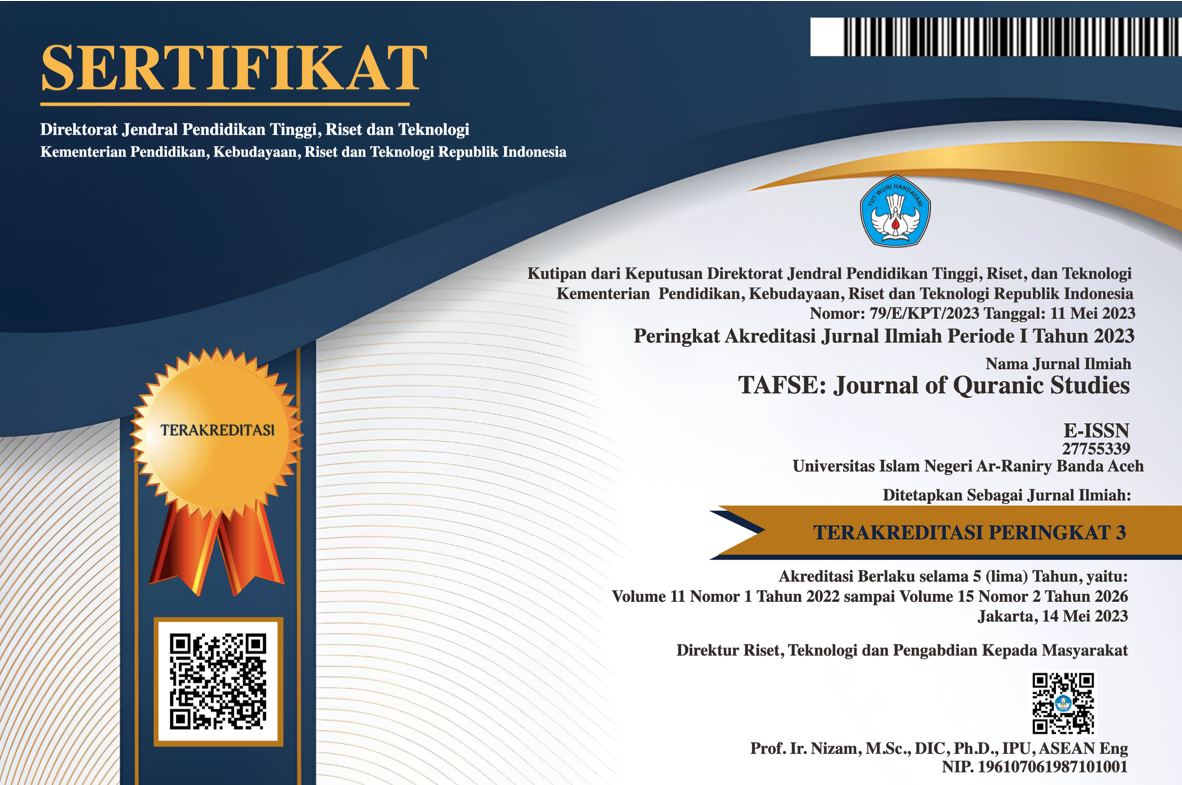Konsep Kenajisan Orang Musyrik dalam Al-Qur’an (Surat Al-Taubah Ayat 28)
DOI:
https://doi.org/10.22373/tafse.v5i2.9066Keywords:
Najis, Musyrik, Fath al-MakkahAbstract
After Fath of Mecca, polytheists are forbidden to perform hajj and umrah. More precisely this prohibition took effect in the year 10 H. This prohibition began with the granting of unclean status for the polytheists. This article will conduct a study of the uncleanness of the polytheists who are conceptualized in the QS. al-Taubah (9): 28. This study was conducted with the assumption that al-Qur'an is present in the locality of the Arabian peninsula. The formulation of the problem of this study is how the context of the decline in QS. al-Taubah (9): 28 and how the commentators interpret the verse. The results of this study indicate that the QS. al-Taubah descended on Mecca in 9 H. At that time Mecca was already controlled by Muslims and began to be sterilized by the polytheists. So that the polytheists were forbidden to perform Hajj and Umrah or forbidden to enter the city of Mecca at all. Then, the majority of commentators interpret that the uncleanness of the polytheists is due to the shirk that is in him. In addition, the ban also resulted in the population of Mecca being worried about the impact on trade. However, Allah gave sufficiency to the population of Mecca with rain falling, residents in areas around Mecca who converted to Islam.
Pasca fath al-Makkah, orang-orang musyrik dilarang untuk melaksanakan haji dan umrah, lebih tepatnya berlaku pada tahun 10 H. Pelarangan ini bermula dari pemberian status najis bagi orang-orang musyrik. Artikel ini akan melakukan kajian tentang kenajisan orang musyrik yang terkonsep dalam QS. al-Taubah (9): 28. Kajian ini dilakukan dengan asumsi bahwa al-Qur’an hadir dalam lokalitas jazirah Arab. Tulisan ini akan mengkaji bagaimana konteks turunnya QS. al-Taubah (9): 28 dan bagaimana penafsiran atas ayat tersebut. Adapun hasil kajian ini menunjukkan bahwa QS. al-Taubah turun di Mekah tahun 9 H. Ketika itu, Mekah sudah dikuasai oleh umat Islam dan mulai dilakukan sterilisasi dari orang-orang musyrik. Sehingga orang-orang musyrik dilarang untuk melakukan haji dan umrah atau dilarang memasuki kota Mekah sama sekali. Mayoritas mufasir menafsirkan bahwa kenajisan orang-orang musyrik adalah karena kesyirikan yang ada di dalam dirinya. Selain itu, pelarangan tersebut juga berakibat pada penduduk Mekah khawatir atas imbasnya pada perdagangan. Akan tetapi, Allah memberi kecukupan pada penduduk Mekah dengan hujan yang turun, sehingga penduduk di daerah-daerah sekitar Mekah masuk Islam.
Downloads
References
Abu Ihsan al-Atsari. Kupas Tuntas Tiga Prinsip Pokok Agama. Solo: at-Tibyan, 2015.
Al-Baydhawi, Nashir al-Din. Anwar al-Tanzil wa Asrar al-Ta’wil. Vol. 3. Beirut: Dar Ihya’ al-Turats al-’Arabi, t.th.
Al-Dimasyqi, A. Tafsir Ibnu Katsir. Bandung: Sinar Baru Algensindo, 2000.
Al-Farmawi, Abd al-Hayy. Metode Tafsir Maudhu’i Suatu Pengantar. Jakarta: PT Raja Grafindo Persada, 1996.
Al-Maghlouth, Sami bin Abdullah. Atlas Sejarah Para Nabi dan Rasul. Jakarta: Almahira, 2011.
Al-Maliky, Ahmad Ibnu Muhammad al-Showy. “Al-Hasyiyah al-’Allamah al-Shawy 'ala tafsir al-Jalalain.” Al-Haromain. Vol. 2 (t.th.).
Al-Qardhawi, Yusuf. Hakikat Tauhid dan Fenomena Kemusyrikan. Terj. Musyaffa. Cet. 5. Jakarta: Robbani Press, 2005.
Al-Qurthuby, Ahmad bin Abi Bakr. Al-Jami’ li Ahkam al-Qur’an wa al-Mubayyinu lima Tadhammanahu min al-Sunnah wa Ayi al-Furqan. Vol. 10. Beirut: al-Risalah, 2006.
Al-Razi, Fakhr al-Din. Mafatih al-Ghaib. Vol. 16. Beirut: Dar al-Fikr, 1981.
Al-Zamakhsyari, Muhammad ibn Umar. Tafsir Al-Kasysyaf ’an Haqaiq Ghawamidh al-Tanzil wa ’Uyun al-Aqawil fi Wujuh al-Ta’wil. Vol. 3. Riyadh: Maktabah al-’Abikat, 1998.
Al-Zuhaili, Wahbah. al-Tafsir al-Wasith. Beirut: Dar al-Fikri, 2001.
Azmi Abu ’Ani. Fiqih Ibadah Praktis. Padang: Pustaka Ar-Rayyan, 2015.
Badri Yatim. Sejarah Peradaban Islam. Jakarta: Raja Grafindo Persada, 2005.
Budy Prestiawan. “Menikahi Orang Musyrik Prespektif al-Jashash dan al-Qurthubi: Analisa Surat al-Baqarah: 221 dalam Tafsir Ahkam al-Qur'an dan Jami’ li Ahkam al-Qur'an.” Skripsi, UIN Syarif Hidayatullah, 2014.
Harifuddin Cawidu. Konsep Kufr dalam al-Quran. Cet. 1. Jakarta: Bulan Bintang, 1991.
Ibnu Manzur. Lisan al-’Arab. Beirut: Dar al-Ma’arif, t.th.
Imaduddin Abdulrahim. Kuliah Tauhid. Cet. 2. Jakarta: Gema Insani Press, 2002.
Labib Mz. Tuntunan Shalat. Jakarta: Sandro Jaya Jakarta, 2005.
M. Yusuf Abdurrahman. Tamparan-tamparan Keras bagi Pelaku Dosa-dosa Besar. Jogjakarta: Safirah, 2012.
Muhammad Bagir. Fiqih Praktis I: Menurut al-Quran, as Sunnah, dan Pendapat Para Ulama. Bandung: Karisma, 2008
Muhammad Muhlis. "Dimensi Syirik dalam Konteks Privatisasi Beragama Islam." Pancawahana: Jurnal Studi Islam, Vol. 14, No. 2. (2019).
Nawawi al-Jawi, Muhammad bin Umar. Marah Labid li Kasyf Ma’ani al-Qur’an al-Majid. Vol. 1. Beirut: Dar al-Kutub al-Ilmiyah, 1997.
Ridha, Muhammad Rasyid. Tasir al-Qur’an al-Hakim. , Juz 10. Beirut: Dar al-Ma’rifah, t.th.
Rizalman bin Muhammad dan Ishak bin Sulaiman. Pelaksanaan Ibadah Haji di Zaman Pra Islam (Jahiliyyah) dalam Perspektif Sejarah. Malasyia, 2015.
Rohmadi. “Komoditi dan Konsumsi Benda Najis Dalam Islam.” Al-Intaj Vol. 1, No. 2 (September 2015).
Tim Penyusun Kamus Pembinaan dan Pengembangan Bahasa. Kamus Besar Bahasa Indonesia. Jakarta: Balai Pustaka, 1990.
Yudha Djuparia Putra. “Hermeneutika Tafsir Qur’ani sl-Mishbah tentang 10 Perintah Terhadap Orang Musyrik Pada Ayat 151 Sampai 153 Surat al-An’am dalam Membangun Masyarakat Islami.” Ph.D Thesis, Universitas Komputer Indonesia, 2015.
Downloads
Published
Issue
Section
License
Authors who publish with this journal agree to the following terms:
- Authors retain copyright and grant the journal right of first publication with the work simultaneously licensed under a Creative Commons Attribution License (CC BY NC 4.0) that allows others to share the work with an acknowledgment of the work's authorship and initial publication in this journal.
- Authors are able to enter into separate, additional contractual arrangements for the non-exclusive distribution of the journal's published version of the work (e.g., post it to an institutional repository or publish it in a book), with an acknowledgment of its initial publication in this journal.
- Authors are permitted and encouraged to post their work online (e.g., in institutional repositories or on their website) prior to and during the submission process, as it can lead to productive exchanges, as well as earlier and greater citation of published work (See The Effect of Open Access).





